8 Dive into Functions¶
8.1 Exercises¶
8.1.1 Exercise¶
Without executing the code in Python interpreter, can you determine what the code below print out. help you by drawing diagram.
Hint locals print a dictionary with local variable as keys and their respective values.
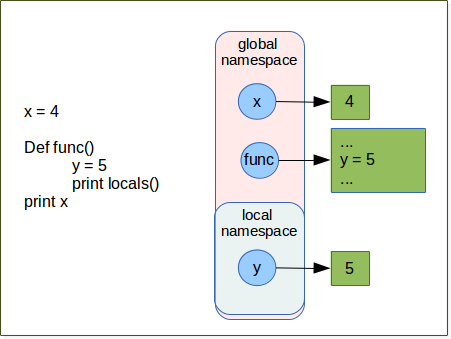
x = 4
def func():
y = 5
print(locals())
>>> func()
{'y': 5}
>>> print(x)
4

8.1.2 Exercise¶
Without executing the code in Python interpreter, can you determine what the code below print out. help you by drawing diagram.
Hint locals print a dictionary with local variable as keys and their respective values.
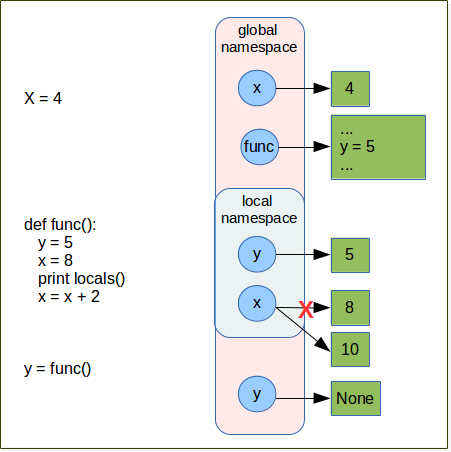
x = 4
def func():
y = 5
x = 8
print(locals())
x = x + 2
>>> y = func()
{'y': 5, 'x': 8}
>>>
>>> print(y)
None
>>> print(x)
4

8.1.3 Exercise¶
Without executing the code in Python interpreter, can you determine what the code below print out. help you by drawing diagram.
Hint locals print a dictionary with local variable as keys and their respective values.
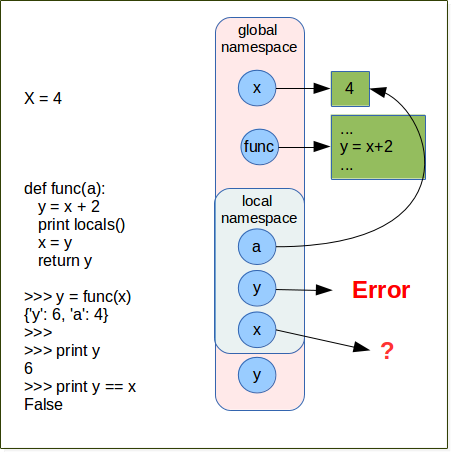
x = 4
def func(a):
y = x + 2
print(locals())
x = y
return y
>>> y = func(x)
Traceback (most recent call last):
File "<stdin>", line 1, in <module>
File "<stdin>", line 2, in func
UnboundLocalError: local variable 'x' referenced before assignment
Unlike what we might think in y = x + 2 x is not get from the global scope. As soon as you make an assignment to a variable in a scope, that variable becomes local to that scope and shadows any similarly named variable in the outer scope. even if the assignment appear later in code. Here x = y make x as local variable whatever you are in func. so at line y = x + 2 we try to use the local variable x but we have to asign it a value (it is done later) so Python raise an UnboundLocalError (see python faq for details)

8.1.4 Exercise¶
Without executing the code in Python interpreter, can you determine what the code below print out. help you by drawing diagram.
Hint locals print a dictionary with local variable as keys and their respective values.
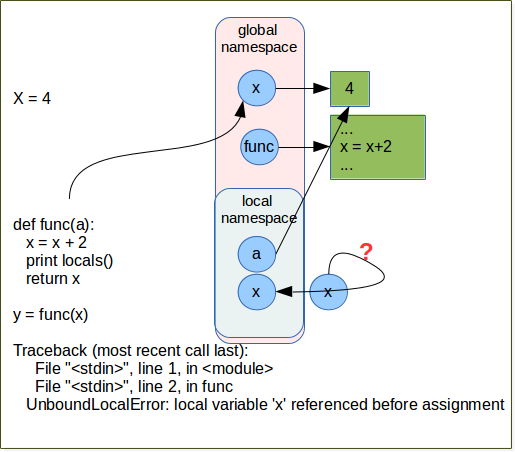
x = 4
def func(a):
x = x + 2
print(locals())
return x
y = func(x)
Traceback (most recent call last):
File "<stdin>", line 1, in <module>
File "<stdin>", line 2, in func
UnboundLocalError: local variable 'x' referenced before assignment
print y
print y == x

8.1.5 Exercice¶
Without executing the code in Python interpreter, can you determine what the code below print out. help you by drawing diagram.
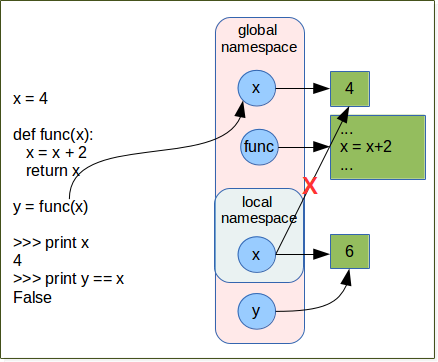
x = 4
def func(x):
x = x + 2
return x
y = func(x)
>>> print(x)
4
>>> print(y == x)
False

8.1.6 Exercice¶
Without executing the code in Python interpreter, can you determine what the code below print out. help you by drawing diagram.
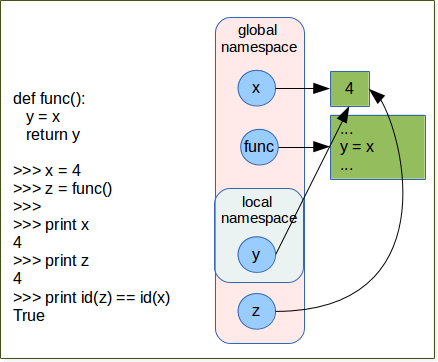
def func():
y = x
return y
>>> x = 4
>>> z = func()
>>>
>>> print(x)
4
>>> print(z)
4
>>> print(id(z) == id(x))
True

8.1.7 Exercice¶
Without executing the code in Python interpreter, can you determine what the code below print out. help you by drawing diagram.
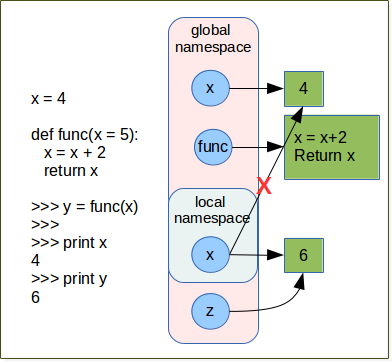
x = 4
def func(x=5):
x = x + 2
return x
>>> y = func(x)
>>>
>>> print(x)
4
>>> print(y)
6

8.1.8 Exercice¶
Without executing the code in Python interpreter, can you determine what the code below print out. help you by drawing diagram.
Hint locals print a dictionary with local variable as keys and their respective values.
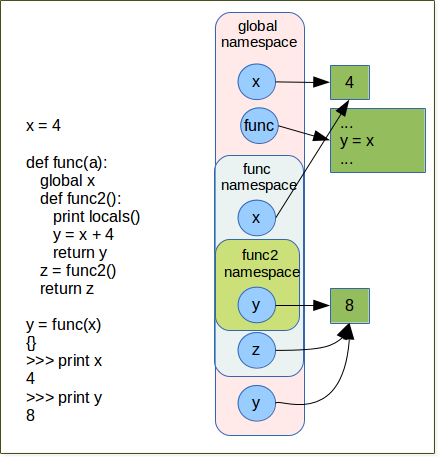
x = 4
def func(a):
global x
def func2():
print(locals())
y = x + 4
return y
z = func2()
return z
y = func(x)
{}
>>> print(x)
4
>>> print(y)
8

8.1.9 Exercice¶
Without executing the code in Python interpreter, can you determine what the code below print out. help you by drawing diagram.
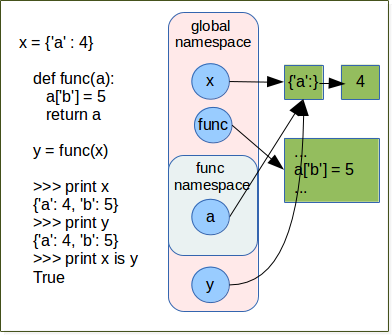
x = {'a' : 4}
def func(a):
a['b'] = 5
return a
y = func(x)
>>> print(x)
{'a': 4, 'b': 5}
>>> print y
{'a': 4, 'b': 5}
>>> print(x is y)
True

8.1.10 Exercice¶
Without executing the code in Python interpreter, can you determine what the code below print out. help you by drawing diagram.
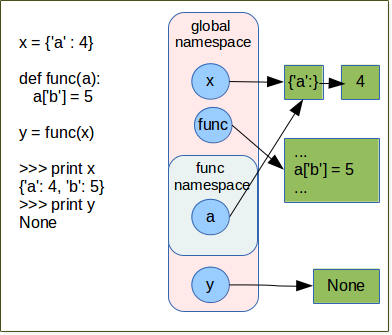
x = {'a' : 4}
def func(a):
a['b'] = 5
y = func(x)
>>> print(x)
{'a': 4, 'b': 5}
>>> print(y)
None

8.1.11 Exercice¶
Without executing the code in Python interpreter, can you determine what the code below print out. help you by drawing diagram.
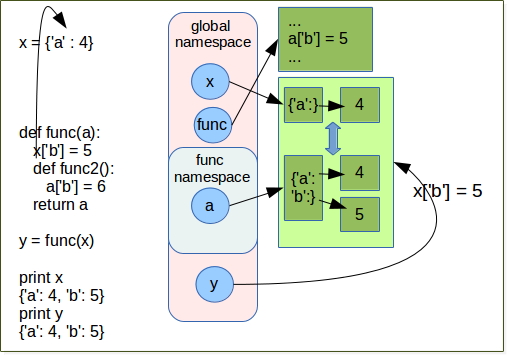
x = {'a' : 4}
def func(a):
x['b'] = 5
def func2():
a['b'] = 6
return a
y = func(x)
print x
{'a': 4, 'b': 5}
print y
{'a': 4, 'b': 5}

8.1.12 Exercice¶
Without executing the code in Python interpreter, can you determine what the code below print out. help you by drawing diagram.
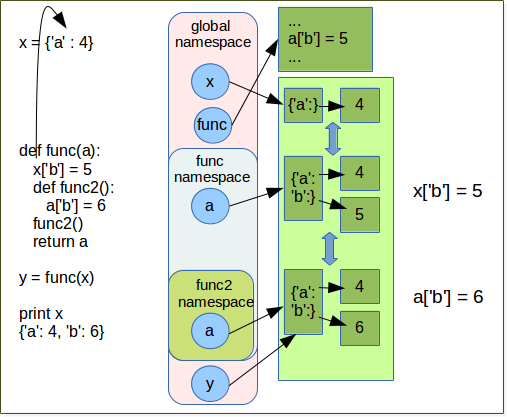
x = {'a' : 4}
def func(a):
x['b'] = 5
def func2():
a['b'] = 6
func2()
return a
y = func(x)
print(x)
{'a': 4, 'b': 6}

8.1.13 Exercice¶
Without executing the code in Python interpreter, can you determine what the code below print out. help you by drawing diagram.

x = {'a' : 4}
def func(a):
x['b'] = 5
def func2(x):
x['b'] = 6
func2(a.copy())
return a
y = func(x)
print(x)
{'a': 4, 'b': 5}

8.1.14 Exercise¶
Write a function translate that have a nucleic sequence as parameter, and return the translate sequence. We give you a genetic code :
code = { 'ttt': 'F', 'tct': 'S', 'tat': 'Y', 'tgt': 'C',
'ttc': 'F', 'tcc': 'S', 'tac': 'Y', 'tgc': 'C',
'tta': 'L', 'tca': 'S', 'taa': '*', 'tga': '*',
'ttg': 'L', 'tcg': 'S', 'tag': '*', 'tgg': 'W',
'ctt': 'L', 'cct': 'P', 'cat': 'H', 'cgt': 'R',
'ctc': 'L', 'ccc': 'P', 'cac': 'H', 'cgc': 'R',
'cta': 'L', 'cca': 'P', 'caa': 'Q', 'cga': 'R',
'ctg': 'L', 'ccg': 'P', 'cag': 'Q', 'cgg': 'R',
'att': 'I', 'act': 'T', 'aat': 'N', 'agt': 'S',
'atc': 'I', 'acc': 'T', 'aac': 'N', 'agc': 'S',
'ata': 'I', 'aca': 'T', 'aaa': 'K', 'aga': 'R',
'atg': 'M', 'acg': 'T', 'aag': 'K', 'agg': 'R',
'gtt': 'V', 'gct': 'A', 'gat': 'D', 'ggt': 'G',
'gtc': 'V', 'gcc': 'A', 'gac': 'D', 'ggc': 'G',
'gta': 'V', 'gca': 'A', 'gaa': 'E', 'gga': 'G',
'gtg': 'V', 'gcg': 'A', 'gag': 'E', 'ggg': 'G'
}
8.1.14.1 bonus¶
This function have to take the phase as parameter
1genetic_code = { 'ttt': 'F', 'tct': 'S', 'tat': 'Y', 'tgt': 'C',
2 'ttc': 'F', 'tcc': 'S', 'tac': 'Y', 'tgc': 'C',
3 'tta': 'L', 'tca': 'S', 'taa': '*', 'tga': '*',
4 'ttg': 'L', 'tcg': 'S', 'tag': '*', 'tgg': 'W',
5 'ctt': 'L', 'cct': 'P', 'cat': 'H', 'cgt': 'R',
6 'ctc': 'L', 'ccc': 'P', 'cac': 'H', 'cgc': 'R',
7 'cta': 'L', 'cca': 'P', 'caa': 'Q', 'cga': 'R',
8 'ctg': 'L', 'ccg': 'P', 'cag': 'Q', 'cgg': 'R',
9 'att': 'I', 'act': 'T', 'aat': 'N', 'agt': 'S',
10 'atc': 'I', 'acc': 'T', 'aac': 'N', 'agc': 'S',
11 'ata': 'I', 'aca': 'T', 'aaa': 'K', 'aga': 'R',
12 'atg': 'M', 'acg': 'T', 'aag': 'K', 'agg': 'R',
13 'gtt': 'V', 'gct': 'A', 'gat': 'D', 'ggt': 'G',
14 'gtc': 'V', 'gcc': 'A', 'gac': 'D', 'ggc': 'G',
15 'gta': 'V', 'gca': 'A', 'gaa': 'E', 'gga': 'G',
16 'gtg': 'V', 'gcg': 'A', 'gag': 'E', 'ggg': 'G'
17 }
18
19def translate(nuc_seq, code):
20
21 prot_seq = ''
22 n = 0
23 # to avoid to compute len(seq)/3 at each loop
24 # I compute it once and use a reference
25 # it could be expensive if the sequence is very long.
26
27 # another way to determine the end of looping
28 # stop_iteration = len(nuc_seq)
29 # while (start + 2) < stop_iteration:
30 cycle = len(nuc_seq)//3
31 while n < cycle:
32 start = n * 3
33 end = start + 3
34 codon = nuc_seq[start:end]
35 codon = codon.lower()
36 if codon in code:
37 prot_seq += code[codon]
38 else:
39 raise RuntimeError("unknow codon: " + codon)
40 n += 1
41 # if use the other looping solution
42 # n += 3
43 return prot_seq
44
45def translate2(nuc_seq, code, phase = 1):
46 prot_seq = ''
47 if 0 < phase < 4 :
48 start = phase - 1
49 nuc_seq = nuc_seq[start:]
50 elif -4 < phase < 0:
51 start = -phase - 1
52 nuc_seq = nuc_seq[::-1]
53 nuc_seq = nuc_seq[start:]
54 prot_seq = translate(nuc_seq, code)
55 return prot_seq
8.1.15 Exercise¶
Write a program that calculates the similarity of 2 RNA sequences.
To compute the similarity you need to parse a file containing the
similarity matrix.Hint: use the module containing the functions that handle a matrix from previous chapter. put this matrix.py file in a directory named “my_python_lib” in your home or Desktop and import it in your current program (the similarity script must be placed elsewhere).
The similarity of the 2 sequences is the sum of base similarities. so you have to compare the first base of two sequences and use the matrix to get the similarity from the similarity table, on so on for all bases then sum these similarities.
First implementation (list of columns)
1"""
2Implementation of simple matrix
3"""
4
5
6def create(row_num, col_num, val=None):
7 """
8 :param row_num: the number of rows
9 :type row_num: int
10 :param col_num: the number of columns
11 :type col_num: int
12 :param val: the default value to fill the matrix
13 :type val: any (None by default)
14 :return: matrix of rows_num x col_num
15 :rtype: matrix
16 """
17 matrix = []
18 for i in range(col_num):
19 col = [val] * row_num
20 matrix.append(col)
21 return matrix
22
23
24def _check_index(matrix, row_no, col_no):
25 """
26 check if row_no and col_no are in matrix bound
27
28 :param matrix: the matrix to compute the size
29 :type matrix: matrix
30 :param rows_no: the index of row to check
31 :type rows_no: int
32 :param col_no: the index of column to check
33 :type col_no: int
34 :raise: IndexError if row_no or col_no are out of matrix bounds
35 """
36 row_max, col_max = size(matrix)
37 if (row_no < 0 or row_no >= row_max) or (col_no < 0 or col_no >= col_max):
38 raise IndexError("matrix index out of range")
39
40
41def size(matrix):
42 """
43 :param matrix: the matrix to compute the size
44 :type matrix: matrix
45 :return: the size of matrix (number of rows, number of cols)
46 :rtype: typle of 2 int
47 """
48 return len(matrix[0]), len(matrix)
49
50
51def get_cell(matrix, row_no, col_no):
52 """
53 :param matrix: the matrix
54 :type matrix: matrix
55 :param rows_no: the row number
56 :type rows_no: int
57 :param col_no: the column number
58 :type col_no: int
59 :retrun: the content of cell corresponding to row_no x col_no
60 :rtype: any
61 """
62 _check_index(matrix, row_no, col_no)
63 return matrix[col_no][row_no]
64
65
66def set_cell(matrix, row_no, col_no, val):
67 """
68 set the value val in cell specified by row_no x col_no
69
70 :param matrix: the matrix to modify
71 :type matrix: matrix
72 :param row_no: the row number of cell to set
73 :type rows_no: int
74 :param col_no: the column number of cell to set
75 :type col_no: int
76 :param val: the value to set in cell
77 :type val: int
78 """
79 _check_index(matrix, row_no, col_no)
80 matrix[col_no][row_no] = val
81
82
83def to_str(matrix):
84 """
85 :param matrix: the matrix to compute the size
86 :type matrix: matrix
87 :return: a string representation of the matrix
88 :rtype: str
89 """
90 s = ""
91 # by design all matrix cols have same size
92 for row in zip(*matrix):
93 cells = [str(cell) for cell in row]
94 s += "\t".join(cells) + "\n"
95 return s
96
97
98def mult(matrix, val):
99 """
100 :param matrix: the matrix
101 :type matrix: matrix
102 :param val: the value to mult the matrix with
103 :type val: int
104 :return: a new matrix corresponding the scalar product of matrix * val
105 :rtype: matrix
106 """
107 new_matrix = []
108 for col in matrix:
109 new_col = [cell * val for cell in col]
110 new_matrix.append(new_col)
111 return new_matrix
112
113
114def mult_inplace(matrix, val):
115 """
116 compute the scalar product of a matrix and a value
117 do this operation in place
118
119 :param matrix: the matrix
120 :type matrix: matrix
121 :param val: the value to mult the matrix with
122 :type val: int
123 """
124 for col in matrix:
125 for row_nb, cell in enumerate(col):
126 col[row_nb] = cell * val
127
128
129def get_row(matrix, row_no):
130 """
131 :param matrix: the matrix to compute the size
132 :type matrix: matrix
133 :param rows_no: row number
134 :type rows_no: int
135 :return: the row of matrix corresponding to row_no
136 a shallow copy of the row
137 :rtype: list
138 """
139 _check_index(matrix, row_no, 0)
140 row_max, col_max = size(matrix)
141 row = []
142 for col_n in range(col_max):
143 row.append(get_cell(matrix, row_no, col_n))
144 return row
145
146
147def set_row(matrix, row_no, val):
148 """
149 set all cells of row row_no with val
150
151 :param matrix: the matrix to modify
152 :type matrix: matrix
153 :param row_no: the row number
154 :type row_no: int
155 :param val: the value to put in cells
156 :type val: any
157 """
158 _check_index(matrix, row_no, 0)
159 row_max, col_max = size(matrix)
160 for col_n in range(col_max):
161 set_cell(matrix, row_no, col_n, val)
162
163
164def get_col(matrix, col_no):
165 """
166 :param matrix: the matrix get row
167 :type matrix: matrix
168 :param col_no: the column number
169 :type col_no: int
170 :return: the column corresponding to col_no of matrix
171 a shallow copy of the col
172 :rtype: list
173 """
174 _check_index(matrix, 0, col_no)
175 col = matrix[col_no][:]
176 return col
177
178
179def set_col(matrix, col_no, val):
180 """
181 set all cells of col col_no with val
182
183 :param matrix: the matrix to compute the size
184 :type matrix: matrix
185 :param col_no: the column number
186 :type col_no: int
187 :param val: the value to put in cells
188 :type val: any
189 """
190 _check_index(matrix, 0, col_no)
191 for row_n in range(matrix):
192 set_cell(matrix, row_n, col_no, val)
193
194
195def replace_col(matrix, col_no, col):
196 """
197 replace column col_no with col
198
199 :param matrix: the matrix to compute the size
200 :type matrix: matrix
201 :param col_no: the column number to replace
202 :type col_no: int
203 :param col: the list of values to use as replacement of column
204 :type col: list
205 """
206 row_max, col_max = size(matrix)
207 if len(col) != col_max:
208 raise RuntimeError("the size of col {0} does not fit to matrix size {1}x{2}".format(len(col),
209 row_max,
210 col_max))
211 _check_index(matrix, 0, col_no)
212 matrix[col_no] = col
213
214
215def replace_row(matrix, row_no, row):
216 """
217 replace row row_no with row
218
219 :param matrix: the matrix to compute the size
220 :type matrix: matrix
221 :param row_no: the column number
222 :type row_no: int
223 :param row: the list of value to use as replacement of row
224 :type row: list
225 """
226 row_max, col_max = size(matrix)
227 if len(row) != row_max:
228 raise RuntimeError("the size of row {0} does not fit to matrix size {1}x{2}".format(len(row),
229 row_max,
230 col_max))
231 _check_index(matrix, row_no, 0)
232 for col_no, value in enumerate(row):
233 set_cell(matrix, row_no, col_no, value)
234
235
236if __name__ == '__main__':
237 m = create(5, 3)
238 print(m)
239 set_cell(m, 0, 0, 1)
240 set_cell(m, 0, 2, 2)
241 set_cell(m, 4, 0, 12)
242 set_cell(m, 4, 2, 15)
243 print(to_str(m))
244 print("get row 0", get_row(m, 0))
245 print("get col 0", get_col(m, 0))
246
247 m2 = create(3, 2, 4)
248 mult_inplace(m2, 2)
249 print(to_str(m2))
Second implementation (bad variable naming, no documentation)
1# matrix is implemented by list of list
2def matrix_maker(ligne, col, val=None):
3 m = []
4 for i in range(ligne):
5 c = [val] * col
6 m.append(c)
7 return m
8
9#---- functions that depends on the matrix srtructure
10
11def matrix_size(m):
12 return len(m), len(m[0])
13
14def matrix_get(matrix, i, j):
15 _check_matindex(matrix, i, j)
16 return matrix[i][j]
17
18def matrix_set(matrix, i, j, val):
19 _check_matindex(matrix,i,j)
20 matrix[i][j] = val
21
22def to_str(m):
23 m_str = []
24 for row in m:
25 m_str.append('\t'.join([str(cell) for cell in row]))
26 m_str = '\n'.join(m_str)
27 return m_str
28
29
30
31#---- independant regarding matrix structure
32def _check_matindex(matrix,i,j):
33 imax, jmax = matrix_size(matrix)
34 if (i < 0 or i >= imax) or (j < 0 or j >= jmax):
35 raise IndexError("matrix index out of range")
36
37
38def matrix_get_line(matrix, i):
39 _check_matindex(matrix,i,0)
40 im, jm = matrix_size(matrix)
41 line = []
42 for n in range(jm):
43 line.append(matrix_get(matrix, i, n))
44 return line
45
46
47def matrix_set_line(matrix, i, val):
48 _check_matindex(matrix,i,0)
49 im, jm = matrix_size(matrix)
50 for n in range(jm):
51 matrix_set(matrix, i, n, val)
52
53
54def matrix_get_col(matrix, j):
55 _check_matindex(matrix,0,j)
56 im, jm = matrix_size(matrix)
57 col = []
58 for n in range(im):
59 col.append(matrix_get(matrix, n, j))
60 return col
61
62
63def matrix_set_col(matrix, j, val):
64 _check_matindex(matrix,0,j)
65 im, jm = matrix_size(matrix)
66 for n in range(im):
67 matrix_set(matrix, n, j, val)
68
69
70if __name__ == '__main__':
71 m = matrix_maker(5, 3)
72 matrix_set(m,0, 0, 1)
73 matrix_set(m,0, 2, 2)
74 matrix_set(m,4, 0, 12)
75 matrix_set(m,4, 2, 15)
76 print(to_str(m))
77 print("get line 0", matrix_get_line(m, 0))
78 print("get col 0", matrix_get_col(m, 0))
Third implementation (dict {(row, col): value})
1"""
2Implementation of simple matrix
3"""
4
5
6def create(nb_rows, nb_cols, val=None):
7 """
8 :param nb_rows: the number of rows
9 :type nb_rows: int
10 :param nb_cols: the number of columns
11 :type nb_cols: int
12 :param val: the default value to fill the matrix
13 :type val: any (None by default)
14 :return: matrix of nb_rows x nb_cols
15 :rtype: matrix
16 """
17 matrix = {}
18 for i in range(nb_rows):
19 for j in range(nb_cols):
20 matrix[(i, j)] = val
21 return matrix
22
23
24import sys
25major, minor = sys.version_info[:2]
26if major < 3 or (major == 3 and minor < 7):
27 raise NotImplementedError(
28 "Implementation missing for this Python version:"
29 "{}.{}".format(major, minor))
30else:
31 def size(matrix):
32 """
33 :param matrix: the matrix of which we want the size
34 :type matrix: matrix
35 :return: the size of matrix (number of rows, number of cols)
36 :rtype: typle of 2 int
37 """
38 # Not robust, and needs a Python version where dicts preserve
39 # key insertion order.
40 # Only works because matrix was created
41 # using a dict where the last inserted key corresponded
42 # to the the last row and last column
43 (last_row, last_col) = list(matrix.keys())[-1]
44 return (last_row + 1, last_col + 1)
45
46
47def _check_bounds(matrix, row, col):
48 """
49 Check whether row and col are compatible with the matrix size.
50
51 :param matrix: the matrix to check
52 :type matrix: matrix
53 :param row: the index of row to check
54 :type row: int
55 :param col: the index of column to check
56 :type col: int
57 :raise: IndexError if row or col are out of matrix bounds
58 """
59 (nb_rows, nb_cols) = size(matrix)
60 if (row < 0 or row >= nb_rows) or (col < 0 or col >= nb_cols):
61 raise IndexError("matrix index out of range")
62
63
64def get_cell(matrix, row, col):
65 """
66 :param matrix: the matrix
67 :type matrix: matrix
68 :param row: the row number
69 :type row: int
70 :param col: the column number
71 :type col: int
72 :return: the content of cell corresponding to row x col
73 :rtype: any
74 """
75 _check_bounds(matrix, row, col)
76 return matrix[(row, col)]
77
78
79def set_cell(matrix, row, col, val):
80 """
81 Set the value val in cell specified by row x col.
82
83 :param matrix: the matrix to modify
84 :type matrix: matrix
85 :param row: the row number of cell to set
86 :type row: int
87 :param col: the column number of cell to set
88 :type col: int
89 :param val: the value to set in cell
90 :type val: int
91 """
92 _check_bounds(matrix, row, col)
93 matrix[(row, col)] = val
94
95
96def mult(matrix, val):
97 """
98 :param matrix: the matrix
99 :type matrix: matrix
100 :param val: the value to mult the matrix with
101 :type val: int
102 :return: a new matrix corresponding the scalar product of matrix * val
103 :rtype: matrix
104 """
105 new_matrix = []
106 for (coords, value) in matrix.items():
107 new_matrix[coords] = value * val
108 return new_matrix
109
110
111def mult_inplace(matrix, val):
112 """
113 Compute the scalar product of a matrix and a value
114 do this operation in place
115
116 :param matrix: the matrix
117 :type matrix: matrix
118 :param val: the value to mult the matrix with
119 :type val: int
120 """
121 for (coords, value) in matrix.items():
122 matrix[coords] = value * val
123
124
125def get_row(matrix, row):
126 """
127 :param matrix: the matrix
128 :type matrix: matrix
129 :param row: row number
130 :type row: int
131 :return: the row of matrix corresponding to row
132 :rtype: list
133 """
134 _check_bounds(matrix, row, 0)
135 _, nb_cols = size(matrix)
136 row_values = []
137 for col in range(nb_cols):
138 row_values.append(get_cell(matrix, row, col))
139 return row_values
140
141
142def set_row(matrix, row, val):
143 """
144 set all cells of row row with val
145
146 :param matrix: the matrix to modify
147 :type matrix: matrix
148 :param row: the row number
149 :type row: int
150 :param val: the value to put in cells
151 :type val: any
152 """
153 _check_bounds(matrix, row, 0)
154 _, nb_cols = size(matrix)
155 for col in range(nb_cols):
156 set_cell(matrix, row, col, val)
157
158
159def get_col(matrix, col):
160 """
161 :param matrix: the matrix
162 :type matrix: matrix
163 :param col: the column number
164 :type col: int
165 :return: the column corresponding to col of matrix
166 a shallow copy of the col
167 :rtype: list
168 """
169 _check_bounds(matrix, 0, col)
170 nb_rows, _ = size(matrix)
171 col_values = []
172 for row in range(nb_rows):
173 col_values.append(get_cell(matrix, row, col))
174 return col_values
175
176
177def set_col(matrix, col, val):
178 """
179 set all cells of col col with val
180
181 :param matrix: the matrix to modify
182 :type matrix: matrix
183 :param col: the column number
184 :type col: int
185 :param val: the value to put in cells
186 :type val: any
187 """
188 _check_bounds(matrix, 0, col)
189 nb_rows, _ = size(matrix)
190 for row in range(nb_rows):
191 set_cell(matrix, row, col, val)
192
193
194def replace_col(matrix, col, col_values):
195 """
196 replace column col with col_values
197
198 :param matrix: the matrix to modify
199 :type matrix: matrix
200 :param col: the column number to replace
201 :type col: int
202 :param col_values: the list of values to use as replacement of column
203 :type col_values: list
204 """
205 nb_rows, nb_cols = size(matrix)
206 if len(col_values) != nb_rows:
207 raise RuntimeError(
208 f"the size of col_values {len(col_values)} does not fit "
209 f"matrix size {nb_rows} x {nb_cols}")
210 _check_bounds(matrix, 0, col)
211 for row in range(nb_rows):
212 set_cell(matrix, col, row, col_values[row])
213
214
215def replace_row(matrix, row, row_values):
216 """
217 replace row row with row_values
218
219 :param matrix: the matrix to modify
220 :type matrix: matrix
221 :param row: the column number
222 :type row: int
223 :param row: the list of value to use as replacement of row
224 :type row: list
225 """
226 nb_rows, nb_cols = size(matrix)
227 if len(row_values) != nb_cols:
228 raise RuntimeError(
229 f"the size of row_values {len(row_values)} does not fit "
230 f"matrix size {nb_rows} x {nb_cols}")
231 _check_bounds(matrix, row, 0)
232 for col in range(nb_cols):
233 set_cell(matrix, col, row, row_values[col])
234
235
236def to_str(matrix):
237 """
238 :param matrix: the matrix to represent as string
239 :type matrix: matrix
240 :return: a string representation of the matrix
241 :rtype: str
242 """
243 lines = []
244 nb_rows, nb_cols = size(matrix)
245 for row in range(nb_rows):
246 lines.append("\t".join([
247 str(val) for val in get_row(matrix, row)]))
248 return "\n".join(lines)
249
250
251if __name__ == '__main__':
252 m = create(5, 3)
253 print(m)
254 print(to_str(m))
255 set_cell(m, 0, 0, 1)
256 print(m)
257 print(to_str(m))
258 set_cell(m, 0, 2, 2)
259 print(m)
260 print(to_str(m))
261 set_cell(m, 4, 0, 12)
262 print(m)
263 print(to_str(m))
264 set_cell(m, 4, 2, 15)
265 print(m)
266 print(to_str(m))
267 print("get row 0", get_row(m, 0))
268 print("get col 0", get_col(m, 0))
269
270 m2 = create(3, 2, 4)
271 mult_inplace(m2, 2)
272 print(to_str(m2))